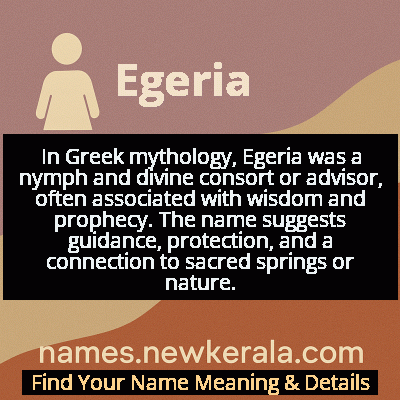Egeria Name Meaning & Details
Origin, Popularity, Numerology Analysis & Name Meaning of Egeria
Discover the origin, meaning, and cultural significance of the name EGERIA. Delve into its historical roots and explore the lasting impact it has had on communities and traditions.
Name
Egeria
Gender
Female
Origin
Greek
Lucky Number
9
Meaning of the Name - Egeria
In Greek mythology, Egeria was a nymph and divine consort or advisor, often associated with wisdom and prophecy. The name suggests guidance, protection, and a connection to sacred springs or nature.
Egeria - Complete Numerology Analysis
Your Numerology Number
Based on Pythagorean Numerology System
Ruling Planet
Mars
Positive Nature
Generous, passionate, energetic, and humanitarian.
Negative Traits
Impulsive, impatient, moody, and can be overly emotional.
Lucky Colours
Red, maroon, scarlet.
Lucky Days
Tuesday.
Lucky Stones
Red coral, garnet.
Harmony Numbers
1, 2, 3, 6.
Best Suited Professions
Military, sports, philanthropy, leadership roles.
What People Like About You
Courage, energy, leadership, generosity.
Famous People Named Egeria
Egeria (mythological)
Water Nymph/Divine Consort
Served as advisor and wife to King Numa Pompilius, credited with establishing Roman religious institutions
Egeria (early Christian)
Pilgrim and Writer
Authored 'Itinerarium Egeriae', one of the earliest surviving pilgrimage accounts of the Holy Land
Egeria (botanical)
Scientific Namesake
Genus of aquatic plants named after the mythological figure, including Egeria densa (waterweed)
Name Variations & International Equivalents
Click on blue names to explore their detailed meanings. Gray names with will be available soon.
Cultural & Historical Significance
In the 4th century AD, the Christian pilgrim Egeria created another layer of significance through her detailed travelogue of the Holy Land. Her 'Itinerarium' provides crucial historical documentation of early Christian worship practices, liturgical development, and the geography of biblical sites. This dual heritage - pagan nymph and Christian pilgrim - makes Egeria a fascinating bridge between classical and medieval worldviews. The continuity of the name across these different cultural contexts demonstrates how ancient archetypes can transform while maintaining their essential symbolic power.
Extended Personality Analysis
Those named Egeria often embody the qualities of their mythological namesake - they tend to be natural counselors with exceptional listening skills and intuitive understanding of human nature. Like the water nymph who advised a king, Egerias typically possess a calm, reflective demeanor that makes others seek their guidance. They often have a strong connection to nature and water environments, finding peace and inspiration in natural settings. Their wisdom is practical and grounded, showing in their ability to navigate complex emotional situations with grace and insight.
Egerias frequently demonstrate a blend of intellectual curiosity and emotional depth, making them excellent students of human behavior and natural phenomena. They tend to be lifelong learners who value knowledge not for its own sake, but for its practical application in helping others. While they may appear reserved initially, Egerias form deep, meaningful relationships and often serve as the 'wise woman' in their social circles. Their combination of nurturing instinct and intellectual capability makes them particularly effective in teaching, counseling, healing professions, or any field that requires both empathy and analytical thinking.
Modern Usage & Popularity
In contemporary naming practices, Egeria occupies a unique niche as a mythological name that combines classical gravitas with environmental resonance. While statistically rare - it has never appeared in the Social Security Administration's top 1000 names in the United States - it maintains consistent usage among parents seeking distinctive names with deep cultural roots. The name sees slightly higher frequency in Mediterranean countries, particularly Italy and Portugal, where classical names remain culturally relevant. Recent trends show a modest increase in usage, likely influenced by several factors: the growing popularity of mythological names following the success of works like 'Circe' and 'Song of Achilles', the environmental movement's emphasis on water conservation (resonating with Egeria's water nymph origins), and the character's appearance in popular video games. The name appeals particularly to educated, culturally-conscious parents who value historical depth and want to give their daughters a name that suggests wisdom, guidance, and connection to nature.
Symbolic & Spiritual Meanings
Egeria embodies rich symbolic meanings that have evolved across centuries while maintaining core associations with wisdom, guidance, and natural elements. Primarily, she symbolizes the sacred spring - a place where earthly and divine knowledge converge, representing the flow of inspiration and intuitive understanding. As a water deity, she carries the symbolic weight of water itself: life-giving, purifying, adaptable yet powerful, and essential for growth. Her role as counselor to King Numa adds layers of meaning about feminine wisdom shaping masculine power, representing the essential balance between intuition and action, reflection and implementation.
The transformation of Egeria from pagan nymph to Christian pilgrim name demonstrates the continuity of archetypal feminine wisdom across religious traditions. Modern interpretations often emphasize her environmental symbolism, seeing her as a patroness of water conservation and ecological balance. In psychological terms, Egeria represents the 'wise self' or inner guide that helps navigate life's complexities. The name's enduring appeal lies in this multifaceted symbolism - it suggests both spiritual depth and practical wisdom, natural connection and cultural sophistication, making it a powerful choice for those who appreciate names with layered meanings and historical resonance.

